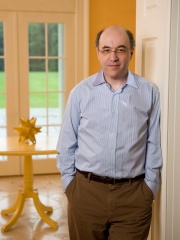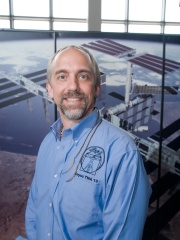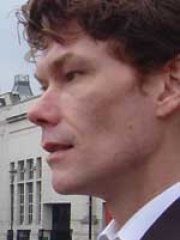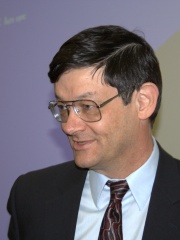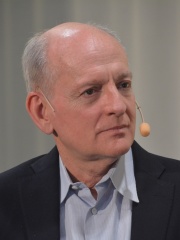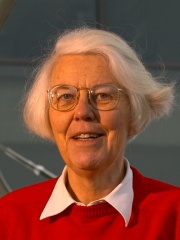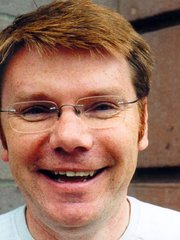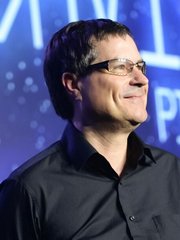

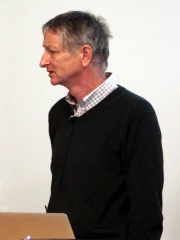
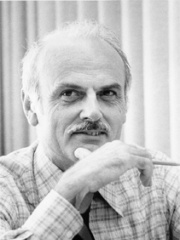
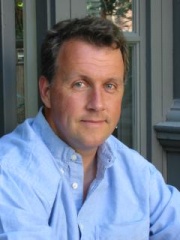
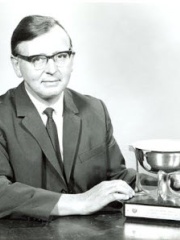
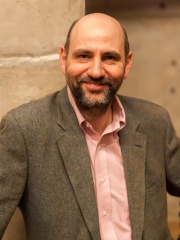
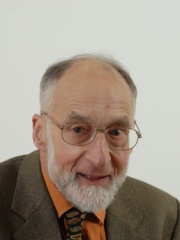
The Most Famous
COMPUTER SCIENTISTS from United Kingdom
This page contains a list of the greatest British Computer Scientists. The pantheon dataset contains 245 Computer Scientists, 22 of which were born in United Kingdom. This makes United Kingdom the birth place of the 2nd most number of Computer Scientists.
Top 10
The following people are considered by Pantheon to be the top 10 most legendary British Computer Scientists of all time. This list of famous British Computer Scientists is sorted by HPI (Historical Popularity Index), a metric that aggregates information on a biography's online popularity. Visit the rankings page to view the entire list of British Computer Scientists.

1. Alan Turing (1912 - 1954)
With an HPI of 85.14, Alan Turing is the most famous British Computer Scientist. His biography has been translated into 159 different languages on wikipedia.
Alan Mathison Turing (; 23 June 1912 – 7 June 1954) was an English mathematician, computer scientist, logician, cryptanalyst, philosopher and theoretical biologist. He was highly influential in the development of theoretical computer science, providing a formalisation of the concepts of algorithm and computation with the Turing machine, which can be considered a model of a general-purpose computer. Turing is widely considered to be the father of theoretical computer science. Born in London, Turing was raised in southern England. He graduated from King's College, Cambridge, and in 1938, earned a doctorate degree from Princeton University. During World War II, Turing worked for the Government Code and Cypher School at Bletchley Park, Britain's codebreaking centre that produced Ultra intelligence. He led Hut 8, the section responsible for German naval cryptanalysis. Turing devised techniques for speeding the breaking of German ciphers, including improvements to the pre-war Polish bomba method, an electromechanical machine that could find settings for the Enigma machine. He played a crucial role in cracking intercepted messages that enabled the Allies to defeat the Axis powers in the Battle of the Atlantic and other engagements. After the war, Turing worked at the National Physical Laboratory, where he designed the Automatic Computing Engine, one of the first designs for a stored-program computer. In 1948, Turing joined Max Newman's Computing Machine Laboratory at the University of Manchester, where he contributed to the development of early Manchester computers and became interested in mathematical biology. Turing wrote on the chemical basis of morphogenesis and predicted oscillating chemical reactions such as the Belousov–Zhabotinsky reaction, first observed in the 1960s. Despite these accomplishments, he was never fully recognised during his lifetime because much of his work was covered by the Official Secrets Act. In 1952, Turing was prosecuted for homosexual acts. He accepted hormone treatment, a procedure commonly referred to as chemical castration, as an alternative to prison. Turing died on 7 June 1954, aged 41, from cyanide poisoning. An inquest determined his death as suicide, but the evidence is also consistent with accidental poisoning. Following a campaign in 2009, British prime minister Gordon Brown made an official public apology for "the appalling way [Turing] was treated". Queen Elizabeth II granted a pardon in 2013. The term "Alan Turing law" is used informally to refer to a 2017 law in the UK that retroactively pardoned men cautioned or convicted under historical legislation that outlawed homosexual acts. Turing left an extensive legacy in mathematics and computing which has become widely recognised with statues and many things named after him, including an annual award for computing innovation. His portrait appears on the Bank of England £50 note, first released on 23 June 2021 to coincide with his birthday. The audience vote in a 2019 BBC series named Turing the greatest scientist of the 20th century. The cognitive scientist Douglas Hofstadter writes: “Atheist, homosexual, eccentric, marathon-running mathematician, A. M. Turing was in large part responsible not only for the concept of computers, incisive theorems about their powers, and a clear vision of the possibility of computer minds, but also for the cracking of German ciphers during the Second World War. It is fair to say we owe much to Alan Turing for the fact that we are not under Nazi rule today.”

2. Tim Berners-Lee (b. 1955)
With an HPI of 75.05, Tim Berners-Lee is the 2nd most famous British Computer Scientist. His biography has been translated into 140 different languages.
Sir Timothy John Berners-Lee (born 8 June 1955), also known as TimBL, is an English computer scientist best known as the inventor of the World Wide Web, HTML, the URL system, and HTTP. He is a professorial research fellow at the University of Oxford and a professor emeritus at the Massachusetts Institute of Technology (MIT). Berners-Lee proposed an information management system on 12 March 1989 and implemented the first successful communication between a Hypertext Transfer Protocol (HTTP) client and server via the Internet in mid-November. He devised and implemented the first Web browser and Web server and helped foster the Web's subsequent development. He is the founder and emeritus director of the World Wide Web Consortium (W3C), which oversees the continued development of the Web. He co-founded (with Rosemary Leith) the World Wide Web Foundation. In 2009, he was elected Foreign Associate of the National Academy of Sciences. Berners-Lee was previously a senior researcher and holder of the 3Com founder's chair at the MIT Computer Science and Artificial Intelligence Laboratory (CSAIL). He is a director of the Web Science Research Initiative (WSRI) and a member of the advisory board of the MIT Center for Collective Intelligence. In 2011, he was named a member of the board of trustees of the Ford Foundation. He is a founder and president of the Open Data Institute and is an advisor at social network MeWe. In 2004, Berners-Lee was knighted by Queen Elizabeth II for his pioneering work. He received the 2016 Turing Award "for inventing the World Wide Web, the first web browser, and the fundamental protocols and algorithms allowing the Web to scale". He was named in Time magazine's list of the 100 Most Important People of the 20th century and has received a number of other accolades for his invention.

3. Geoffrey Hinton (b. 1947)
With an HPI of 69.89, Geoffrey Hinton is the 3rd most famous British Computer Scientist. His biography has been translated into 56 different languages.
Geoffrey Everest Hinton (born 6 December 1947) is a British-Canadian computer scientist, cognitive scientist, and cognitive psychologist known for his work on artificial neural networks, which earned him the title "the Godfather of AI". Hinton is University Professor Emeritus at the University of Toronto. From 2013 to 2023, he divided his time working for Google Brain and the University of Toronto before publicly announcing his departure from Google in May 2023, citing concerns about the many risks of artificial intelligence (AI) technology. In 2017, he co-founded and became the chief scientific advisor of the Vector Institute in Toronto. With David Rumelhart and Ronald J. Williams, Hinton was co-author of a highly cited paper published in 1986 that popularised the backpropagation algorithm for training multi-layer neural networks, although they were not the first to propose the approach. Hinton is viewed as a leading figure in the deep learning community. The image-recognition milestone of the AlexNet designed in collaboration with his students Alex Krizhevsky and Ilya Sutskever for the ImageNet challenge 2012 was a breakthrough in the field of computer vision. Hinton received the 2018 Turing Award, together with Yoshua Bengio and Yann LeCun for their work on deep learning. They are sometimes referred to as the "Godfathers of Deep Learning" and have continued to give public talks together. He was also awarded, along with John Hopfield, the 2024 Nobel Prize in Physics for "foundational discoveries and inventions that enable machine learning with artificial neural networks". In May 2023, Hinton announced his resignation from Google to be able to "freely speak out about the risks of A.I." He has voiced concerns about deliberate misuse by malicious actors, technological unemployment, and existential risk from artificial general intelligence. He noted that establishing safety guidelines will require cooperation among those competing in use of AI in order to avoid the worst outcomes. After receiving the Nobel Prize, he called for urgent research into AI safety to figure out how to control AI systems smarter than humans.

4. Edgar F. Codd (1923 - 2003)
With an HPI of 65.91, Edgar F. Codd is the 4th most famous British Computer Scientist. His biography has been translated into 46 different languages.
Edgar Frank "Ted" Codd (19 August 1923 – 18 April 2003) was a British computer scientist who, while working for IBM, invented the relational model for database management, the theoretical basis for relational databases and relational database management systems. He won the 1981 ACM Turing Award.
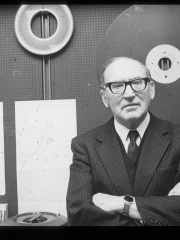
5. Maurice Wilkes (1913 - 2010)
With an HPI of 64.44, Maurice Wilkes is the 5th most famous British Computer Scientist. His biography has been translated into 40 different languages.
Sir Maurice Vincent Wilkes (26 June 1913 – 29 November 2010) was an English computer scientist who designed and helped build the Electronic Delay Storage Automatic Calculator (EDSAC), one of the earliest stored-program computers, and who invented microprogramming, a method for using stored-program logic to operate the control unit of a central processing unit's circuits. In 1967 he won the ACM Turing Award. At the time of his death, Wilkes was an Emeritus Professor at the University of Cambridge.

6. Paul Graham (b. 1964)
With an HPI of 62.64, Paul Graham is the 6th most famous British Computer Scientist. His biography has been translated into 25 different languages.
Paul Graham (; born November 13, 1964) is an English-American computer scientist, writer, essayist, entrepreneur and investor. His work includes the programming language Arc, the startup Viaweb (later renamed Yahoo! Store), co-founding the startup accelerator and seed capital firm Y Combinator, a number of essays and books, and the media webpage Hacker News. He is the author of the computer programming books On Lisp, ANSI Common Lisp, and Hackers & Painters. Technology journalist Steven Levy has described Graham as a "hacker philosopher". Graham was born in England, where he and his family have maintained a permanent residence since 2016. He is also a citizen of the United States, where he attended all of his schooling and lived for 48 years prior to returning to England.

7. James H. Wilkinson (1919 - 1986)
With an HPI of 60.63, James H. Wilkinson is the 7th most famous British Computer Scientist. His biography has been translated into 31 different languages.
James Hardy Wilkinson FRS (27 September 1919 – 5 October 1986) was a prominent figure in the field of numerical analysis, a field at the boundary of applied mathematics and computer science particularly useful to physics and engineering. In 1970 he won the ACM Turing Award.

8. Martin Fowler (b. 1963)
With an HPI of 60.36, Martin Fowler is the 8th most famous British Computer Scientist. His biography has been translated into 23 different languages.
Martin Fowler (18 December 1963) is a British software developer, author and international public speaker on software development, specialising in object-oriented analysis and design, UML, patterns, and agile software development methodologies, including extreme programming. His 1999 book Refactoring popularised the practice of code refactoring. In 2004 he introduced a new architectural pattern, called Presentation Model (PM).

9. Robin Milner (1934 - 2010)
With an HPI of 58.19, Robin Milner is the 9th most famous British Computer Scientist. His biography has been translated into 29 different languages.
Arthur John Robin Gorell Milner (13 January 1934 – 20 March 2010) was a British computer scientist, and he won the 1991 ACM Turing Award.
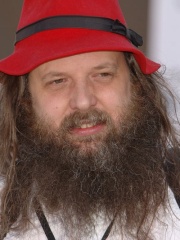
10. Alan Cox (b. 1968)
With an HPI of 58.18, Alan Cox is the 10th most famous British Computer Scientist. His biography has been translated into 27 different languages.
Alan Cox (born 22 July 1968) is a British computer programmer who has been a key figure in the development of Linux. He maintained the 2.2 branch of the Linux kernel and continues to be heavily involved in its development, an association that dates back to 1991. He lives in Swansea, Wales, where he lived with his wife Telsa Gwynne, who died in 2015, and now lives with author Tara Neale, whom he married in 2020. He graduated with a BSc in Computer Science from Swansea University in 1991 and received an MBA from the same university in 2005.
People
Pantheon has 22 people classified as British computer scientists born between 1912 and 1976. Of these 22, 14 (63.64%) of them are still alive today. The most famous living British computer scientists include Tim Berners-Lee, Geoffrey Hinton, and Paul Graham. The most famous deceased British computer scientists include Alan Turing, Edgar F. Codd, and Maurice Wilkes. As of April 2024, 2 new British computer scientists have been added to Pantheon including David Jones, and David Braben.
Living British Computer Scientists
Go to all RankingsTim Berners-Lee
1955 - Present
HPI: 75.05
Geoffrey Hinton
1947 - Present
HPI: 69.89
Paul Graham
1964 - Present
HPI: 62.64
Martin Fowler
1963 - Present
HPI: 60.36
Alan Cox
1968 - Present
HPI: 58.18
Stephen Wolfram
1959 - Present
HPI: 57.93
Demis Hassabis
1976 - Present
HPI: 54.99
Richard Garriott
1961 - Present
HPI: 51.58
Gary McKinnon
1966 - Present
HPI: 50.32
Andrew Morton
1959 - Present
HPI: 49.27
Sophie Wilson
1957 - Present
HPI: 48.18
Stuart J. Russell
1962 - Present
HPI: 48.04
Deceased British Computer Scientists
Go to all RankingsAlan Turing
1912 - 1954
HPI: 85.14
Edgar F. Codd
1923 - 2003
HPI: 65.91
Maurice Wilkes
1913 - 2010
HPI: 64.44
James H. Wilkinson
1919 - 1986
HPI: 60.63
Robin Milner
1934 - 2010
HPI: 58.19
Karen Spärck Jones
1935 - 2007
HPI: 56.43
Kathleen Booth
1922 - 2022
HPI: 53.43
David Marr
1945 - 1980
HPI: 51.90
Newly Added British Computer Scientists (2025)
Go to all RankingsOverlapping Lives
Which Computer Scientists were alive at the same time? This visualization shows the lifespans of the 8 most globally memorable Computer Scientists since 1700.

